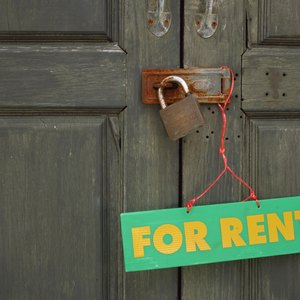
A tenant and landlord likely have similar concerns about their rights in a rental agreement. Both of them might want to know whether the landlord can increase the property rent, and if so, by how much. They should also both understand the consequences of past-due rent and their rights in eviction proceedings. Tennessee sets its own landlord-tenant laws to determine the rights and obligations of the parties involved in a property rental.
Tennessee Landlord-Tenant Laws
Tennessee establishes the state's landlord-tenant laws in Title 66, Chapter 28 of the Tennessee Code, also known as the "Landlord and Tenant Act." According to the Tennessee Consumer Affairs Division, while the act applies to rental arrangements in most Tennessee counties, the act generally doesn't apply to counties with fewer than 68,000 residents as determined by the most recent census. When applicable, the act sets the rights and obligations of landlords and tenants. For example, the act sets the requirements of a valid lease and the criteria to enforce the agreement.
Amount of Rent
The terms of the lease agreement should state the amount of rent to be paid by the tenant occupying the Tennessee rental property. The lease should also identify the due date for rent during each month or another interval during the rental period. In addition, the lease likely explains the penalties, such as a late fee, that the landlord may impose if the tenant does not pay the specified amount of rent in a timely manner.
Rent Increases During Lease Term
A Tennessee landlord can't raise the rent during the period covered by the tenant's lease agreement unless the lease specifically allows the landlord to do so. The Tennessee Alliance for Legal Services suggests that a prospective tenant carefully review the terms of a lease and avoid signing an agreement that gives an unfair advantage, such as the right to increase the tenant's rent at any time, to the landlord. The landlord may also increase the rent during the lease term if the tenant agrees.
Past-Due Rent
Late or past-due rent often strains a tenant's relationship with the landlord. To compensate for past-due rent, a landlord might try to seize the tenant's personal property. However, in Tennessee, the landlord can't take personal property unless specifically permitted in the lease agreement. Past-due rent also serves as a basis for eviction proceedings under Tennessee law because failure to pay rent breaches the landlord-tenant agreement. The landlord has a right to pursue the tenant's eviction by providing written notice and following the other procedural requirements in state law.
Rent Control
Rent control limits the amount by which a landlord can increase property rent at the end of the current lease. Rent control affects landlords in only a few states and Tennessee is not one of those states. Some states have enacted statutes to specifically prevent local governments or counties from allowing rent control. Section 66-35-102 of the Tennessee Landlord and Tenant Act preempts local governments from passing their own rent-control ordinances. As such, Tennessee law does not protect tenants from large or unexpected increases in rent through rent control.
References
- Tennessee Consumer Affairs Division: Landlord and Tenant Act
- Tennessee Legal Aid: Do You Know Your Rights and Duties As a Renter?
- Tennessee Legal Aid: Eviction
- Rent Control Laws by State; National Multi Housing Council; Feb. 10, 2006
- Justia: 2010 Tennessee Code Title 66 - Property Chapter 35 - Rent Control 66-35-102
- Joint Center for Housing Studies at Harvard University. "America's Rental Housing 2020," Page 9. Accessed March 20, 2020.
- Nolo. "State Laws on Landlord's Access to Rental Property." Accessed March 20, 2020.
- Nolo. "How Evictions Work: Rules for Landlords and Property Managers." Accessed March 20, 2020.
- U.S. Department of Housing and Urban Development. "Housing Discrimination Under the Fair Housing Act." Accessed March 20, 2020.
Writer Bio
Cindy Chung is a California-based professional writer. She writes for various websites on legal topics and other areas of interest. She holds a B.A. in education and a Juris Doctor.

